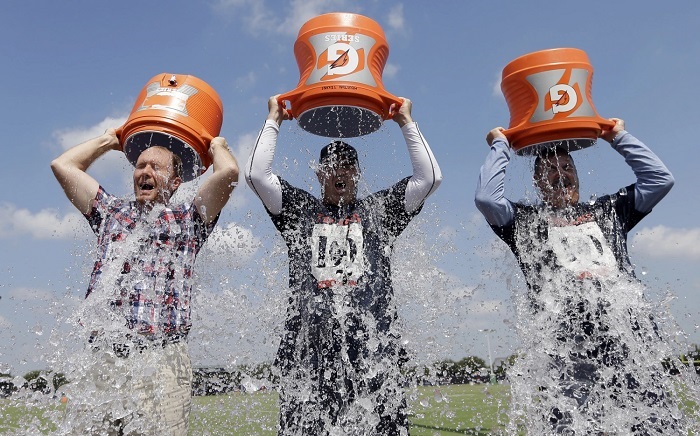Health
ALS Ice Bucket Challenge Marks Decade of Awareness and Research at Fenway Park

- Fenway Park hosted an event for the 10th anniversary of the ALS Ice Bucket Challenge, raising awareness and funds for ALS research.
- The Ice Bucket Challenge has raised $250 million and sparked an additional $1 billion in research funding, leading to significant advances in ALS treatments.
- The event emphasized community support and the continued need for awareness and research to combat ALS, a progressive neurodegenerative disease with no known cure.
Fenway Park witnessed a remarkable occasion on Thursday when hundreds of people, which included the Massachusetts governor as well as notable athletes, splashed cold water over their own. The event was the 10th anniversary celebration of the ALS Ice Bucket Challenge, an online social media phenomenon which has greatly aided ALS awareness and research.
The Ice Bucket Challenge, which has become a worldwide phenomenon since 2014, has generated $250 million as of now. These funds have not just helped research, but they have been able to generate the addition of $1 billion in funds aimed at finding the cure for ALS or Lou Gehrig’s Disease. It is named after Lou Gehrig, the famous New York Yankees player, is a degenerative neurodegenerative disease which causes paralysis leading to the death of motor neurons that reside in the brain and spinal cord. Although there has been a lot of research on the subject and clinical trials, there’s no treatment for ALS.
The tournament was held at Fenway Park aimed to rekindle enthusiasm for the cause and build on the momentum that has been built over the last decade. The Ice Bucket Challenge was initially motivated by a Facebook message from the professional golfer Chris Kennedy. Kennedy challenged his wife’s cousin to throw a bucket full of ice over her head and then share the video on social media, and then challenge other people to take the challenge or give to the charity of their choice. The campaign quickly gained attention because of the hard work of two people that were confirmed to have ALS. The involvement of these two individuals brought the contest to the forefront which led to the emergence of thousands participants including famous political figures, and athletes.
The simplest of tasks–dumping an ice bucket over the head of a person had a significant influence on bringing awareness to ALS. It drew attention from all over the world to the illness and increased research efforts. The celebration held in Fenway Park served as an opportunity to recall the origins of the disease and continues to impact fighting ALS.
One of the major outcomes from the Ice Bucket Challenge is the more money being allocated to ALS research. The increase in funds for research has resulted in the creation of new drugs for treating this disease, and also drawn many researchers to research in the area. This has proven that an act of simple will lead to significant improvements in medical research, and offer some hope for those suffering from ALS.
This year’s Fenway Park event saw about 75 people, which included parents with children under the age of 5, that gathered at the ball field to compete in the contest. While they splashed ice-cold water on their heads it was not just an instant of relaxation from the heat of the day but also a feeling of unity and love to ALS sufferers and their families.
On the stands, numerous people watched the show in awe as well as a sense of hope and appreciation. A participant who was diagnosed with ALS this year, spoke of gratitude for the generosity and compassion shown by his friends as well as neighbors and strangers alike. These events bring us back to the massive efforts required to fight this devastating illness and also the importance of community to effect positive change.
The Ice Bucket Challenge has left an indelible mark, emphasizing the significance of raising awareness and fundraising to combat ALS. The campaign will continue to encourage and motivate all over the globe and acts as a source of hope to those who are suffering from the illness as well as a testimony to the strength of humanity and perseverance.
























































